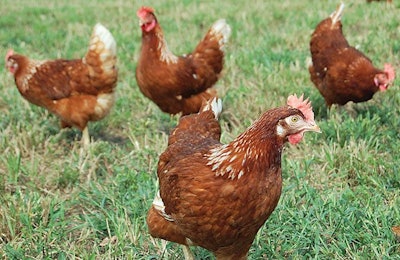
Practicing good biosecurity and preventing disease is less expensive and less of a hassle than treating a poultry flock. By definition, biosecurity is the practice and planning to reduce flock contact with possible disease-causing agents. Biosecurity plans and practices revolve around the idea of prevention rather than treatment, and reducing opportunities for contamination.
While it is hard to control many external factors like wild birds and wind, there are plenty of things that can be controlled on a poultry farm.
These nine biosecurity tips for pastured poultry, offered by Kevin Ellis during a webinar in May 2018, can help poultry producers prevent a disease outbreak from affecting their farm and profitability. Ellis is a poultry specialist with Appropriate Technology Transfer for Rural Areas (ATTRA), a national sustainable agriculture assistance program developed and managed by the National Center for Appropriate Technology (NCAT) and funded by the United States Department of Agriculture (USDA) Rural Business-Cooperative Service.















